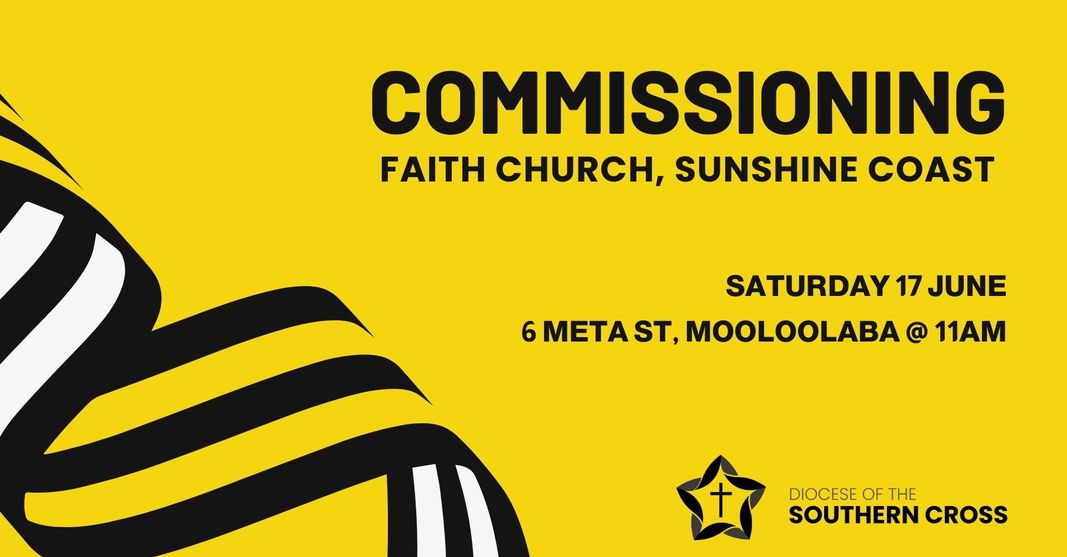The Diocese of the Southern Cross will be the new home for eight Uniting Church in Australia minister who became Anglicans today. An ex-Uniting Congregation now known as Faith Church Sunshine Coast was also officially launched today, creating a major ex Uniting presence in what started as a lifeboat for conservative Anglicans leaving progressive regions of the Anglican Church of Australia.
Bishop Glenn Davies presided at a service titled “The Service of Recognition of Ministers of the Word and Sacramentsts.” The Ministers newly recognised as “presbyters” are
Dr Hedley Fihaki, Philip Anderson, David Graham, Anne Hibbard, Roger Hibbard, Raymond McIlwraith, Lulu Senituli and Harold Strong.
The “recognition” of these ministers is distinct from “ordaining” them which would indicate that they are becoming ministers. Instead the term “recognition’ is used to indicate that they have already been serving as ministers in a different denomination.
“Our sister and brothers, have already been baptised into Christ and have formerly been ordained as Ministers of the Word and Sacraments, under the rules of the Uniting Church of Australia, ” the Bishop said in a liturgy welcoming them. “They now wish to have their orders recognised by the Diocese of the Southern Cross and seek our prayers in the fellowship of this Church.”
Turning to the Minsters, Bishop Glenn continued “”My brothers and sister, we give thanks that you have been lawfully ordained to the office and work of a Minister of the Word and Sacraments in the Church of God.
“I have therefore resolved to recognise you as Presbyters in the Diocese of the Southern Cross.
“That we and this congregation may know that you desire, by God’s grace, to continue this ministry in the Diocese of the Southern Cross, I ask you these questions.” Each minister was asked a series of questions, the key one being, “Do you embrace the faith of the one, holy, catholic and apostolic Church as described in the Fundamental Declarations and the Jerusalem Declaration?”
The diocese points out that this procedure is not novel. “Similar expressions of episcopal welcome with laying on of hands occurred in the establishment of the Churches of North and South India, and were also contemplated in the Anglican-Methodist conversations in England last century.”
The Other Cheek calculates that at this time, the majority of ministers in the diocese will be ex-Uniting Church. Anne Hibbard’s presence further confirms that the new diocese is open to women as ministers.
The recognition of Lulu Senituli signals that his congregation from the dissolved Sunnybank Uniting Church in inner Brisbane will join the new diocese.
The eight ministers are at least mostly from a conservative movement, the Assembly of Confessing Congregations (ACC), which pushed back against progressive theology in the Uniting church But after two churches, Sunnybank and the Mooloolaba congregation that joined the diocese as Faith church, were dissolved by the Uniting Church many began to look for a new church home.
Mooloolaba’s minister Hedley Fihaki the chair of ACC who had his ministerial credentials taken from him by the UCA approached Bishop Glenn Davies and began a months-long exploration about joining the diocese.
As the diocese’s statement points out, the Southern Queensland diocese of the Anglican Church was not an option as it, too has embraced progressive doctrine. The formation of the Diocese of the Southern Cross occurred at a time of need for these ex-Uniting Church evangelicals. The ACC was wound up in April.
Other evangelical groups, such as Propel and Hopenet in South Australia, continue to minister in the Uniting church.
At the service Faith Church, Sunshine Coast is welcomed into the Diocese of the southern cross and Hedley Fihaki was given his license by the bishop, with members of the cogregation taking part. Fihaki was urged by Bishop Glenn Davies: “My brother Hedley,at your ordination, you were exhorted in the name of our Lord Jesus Christ, to remember the dignity of the high office and charge to which you were called: that is to say, to be a messenger, watchman, and steward of our Lord; to teach and forewarn, to feed and provide for the Lord’s family; to seek for Christ’s sheep who are scattered abroad, and for his children who are surrounded by temptation in this world, that they may be saved through Christ for ever.”


Fantastic news. Thank you John Sandemon for posting and covering this so promptly and candidly.
*Sandeman*
‘You were exhorted in the name of our Lord Jesus Christ, to remember the dignity of the high office and charge to which you were called: that is to say, to be a messenger, watchman, and steward of our Lord; to teach and forewarn, to feed and provide for the Lord’s family; to seek for Christ’s sheep who are scattered abroad, and for his children who are surrounded by temptation in this world, that they may be saved through Christ for ever.”
I love these words. May God richly bless you all as you are faithful to His calling.
I recognise that the article presented a difference between “recognition” and “ordination”, but I wonder (without commenting one way or the other) how this sits with Sydney Anglican opposition to women ministers? I ask this question out of interest and not desiring to cast aspersions on either party.
The Diocese of the Southern Cross is sponsored by Gafcon, (the Global Anglican Future Conference) an international body that accepts women ministers. Sydney Diocese, which as you note does not, is a member of Gafcon which includes Anglican provinces (national churches) such as Nigeria which does not have women ministers and Uganda which does. Two Gafcon provinces, Kenya and South Sudan, have women bishops.